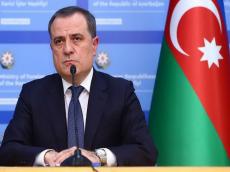|
|
TODAY.AZ / Politics
Azerbaijani Foreign Minister: Baku-Yerevan peace deal possible by end of 2023
23 June 2023 [12:43] - TODAY.AZ

A peace deal was within reach if Armenia was ready to take certain steps, Azernews reports, citing Azerbaijani Foreign Minister Jeyhun Bayramov's interview with Reuters on 21 June.
"If there is a willingness not only to make statements but also to take some practical steps, I think an agreement could potentially be reached even before the end of the year," Jeyhun Bayramov said.
"But if there is no real willingness ... then it could be later," he added.
Azerbaijani Foreign Minister said there had been "some progress" in the peace talks and that Baku was keen to strike a deal, but also made comments that showed how wide the gap was before he would meet his Armenian counterpart for further talks in Washington next week:
"Why did it take the Armenian prime minister two and a half years (since the end of the war) to say that he had effectively recognized Azerbaijan's sovereignty and territorial integrity?"
Bayramov, who traveled to London for a conference on Ukraine's reconstruction, also complained about the continued presence of thousands of Armenian troops on Azerbaijani territory.
Moscow (which has peacekeepers on the ground), Washington, and the European Union are separately trying to help bring lasting peace between Azerbaijan and Armenia, which have endured two wars since the early 1990s and are still exchanging fire from time to time.
After fierce fighting and a Russian-brokered ceasefire in 2020, Azerbaijan seized territories controlled by ethnic Armenians in and around the mountain enclave.
Since then, the two sides have been discussing a peace agreement in which they would agree on borders, resolve differences over the enclave and unfreeze relations.
It seemed like a breakthrough: last month Prime Minister Nikol Pashinian said Armenia did accept that Karabakh was part of Azerbaijan, but wanted Baku to provide guarantees for its ethnic Armenian population.
However, in an interview with Reuters, Azerbaijani Foreign Minister Jeyhun Bayramov said such a guarantee was unnecessary and the demand amounted to interference in Azerbaijan's affairs.
"We do not accept such a precondition ... for a number of reasons," he said.
"The most fundamental is the following: this is an internal, sovereign issue. Azerbaijan's constitution and a number of international conventions to which Azerbaijan is a party provide all the necessary conditions to guarantee the rights of this population."
He said ethnic Armenians can still use and receive education in their native language and preserve their culture, as long as they are integrated into Azerbaijani society and state structures, like other ethnic and religious minorities.
URL: http://www.today.az/news/politics/236369.html
 Print version
Print version
Connect with us. Get latest news and updates.
See Also
- 11 February 2026 [11:25]
President Ilham Aliyev sends congratulatory letter to President of Iran - 11 February 2026 [11:09]
Footage of President Ilham Aliyev's meeting with U.S. Vice President JD Vance posted on his social media - 11 February 2026 [10:43]
U.S. Vice President JD Vance pays tribute to Azerbaijani martyrs in Baku - 10 February 2026 [14:32]
President Ilham Aliyev appoints new chairman of State Statistical Committee - decree - 10 February 2026 [13:13]
Lapshin's eternal complaints and eternal adventures - 09 February 2026 [15:51]
Billions in a backpack and Generals' daughters: a little bit about Zatulin's crazy career - 09 February 2026 [14:40]
President Ilham Aliyev dismisses head of Nakhchivan City Executive Power - decree - 09 February 2026 [14:14]
Levonchik, Rise and Fall: The Story of Kostya Zatulin - 09 February 2026 [13:40]
President Ilham Aliyev receives delegation from Conference of Presidents of Major American Jewish Organizations - 09 February 2026 [12:07]
President Ilham Aliyev receives delegation of the U.S. Chamber of Commerce
Most Popular
 West Azerbaijan Community addresses US Vice President ahead of Azerbaijan visit
West Azerbaijan Community addresses US Vice President ahead of Azerbaijan visit
 Nakhchivan railway project to benefit Azerbaijan and European Union
Nakhchivan railway project to benefit Azerbaijan and European Union
 Iran takes hard line on protest detainees, excluding them from amnesty
Iran takes hard line on protest detainees, excluding them from amnesty
 Baku, Tehran explore restoring passenger travel via land border amid regional connectivity talks
Baku, Tehran explore restoring passenger travel via land border amid regional connectivity talks
 Trump posts map showing Greenland, Canada and Venezuela under US flag
Trump posts map showing Greenland, Canada and Venezuela under US flag
 Billions in a backpack and Generals' daughters: a little bit about Zatulin's crazy career
Billions in a backpack and Generals' daughters: a little bit about Zatulin's crazy career
 Abbas rejects Israel's 'dangerous' West Bank reform plan
Abbas rejects Israel's 'dangerous' West Bank reform plan
